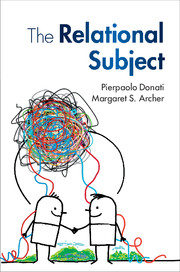Book contents
- Frontmatter
- Dedication
- Contents
- List of figures
- Acknowledgements
- Part I
- Part II
- Prologue: The sources of Relational Subjects and their resources
- 3 The Relational Subject and the person: self, agent, and actor
- 4 Socialization as Relational Reflexivity
- 5 Cultural reproaches to Relationist Sociology
- Part III
- Index
4 - Socialization as Relational Reflexivity
from Part II
Published online by Cambridge University Press: 05 July 2015
- Frontmatter
- Dedication
- Contents
- List of figures
- Acknowledgements
- Part I
- Part II
- Prologue: The sources of Relational Subjects and their resources
- 3 The Relational Subject and the person: self, agent, and actor
- 4 Socialization as Relational Reflexivity
- 5 Cultural reproaches to Relationist Sociology
- Part III
- Index
Summary
Introduction
Often the ability to state a problem is as important as the capacity to solve it. To that extent, Mead's conviction that the processes of socialization and reflexivity (which he called ‘inner conversation’) were necessarily intertwined was a breakthrough. It promised to provide leverage upon inescapable issues: how were ‘individual and society’ connected? How did the social order enter into the constitution of the human being? How was the tension between singular impulses and social normativity resolved? In his responses, Mead never relinquished his belief that the process of socialization also entailed processes of reflexive reception and reflexive reasoning on the part of subjects. This I consider to be his great achievement, despite serious doubts that his key linking mechanism between socialization and reflexivity, the ‘generalized other’, remains responsible today, as he himself came to question after the First World War. Therefore, it seems a squandering of his patrimony that those forming the line of Mead's successors – Parsons, Habermas, and Beck – should all have abandoned reflexivity in their accounts of socialization.
There are also two root difficulties in this long tradition of conceptualizing socialization. The first is that human subjects are cut off from linguistically unmediated relations with the world, as seen in Chapter 3. Habermas, endorsing Mead, encapsulates this when he says that everything the self is emerges because it ‘runs through the network of linguistically mediated interactions’. Intentionality, which is quintessential to meaningful action, is required to make a detour through the medium of language and thus linguistic inter-relations: ‘the linguistic socialization of consciousness and the intentional relation to the world are mutually constitutive in the circular sense that each presupposes the other conceptually.’
To give such epistemological primacy to language precludes any other mode of relational contact between human subjects and the different orders of natural reality (see Chapter 3).
Information
- Type
- Chapter
- Information
- The Relational Subject , pp. 123 - 154Publisher: Cambridge University PressPrint publication year: 2015
Accessibility standard: Unknown
Why this information is here
This section outlines the accessibility features of this content - including support for screen readers, full keyboard navigation and high-contrast display options. This may not be relevant for you.Accessibility Information
- 7
- Cited by
